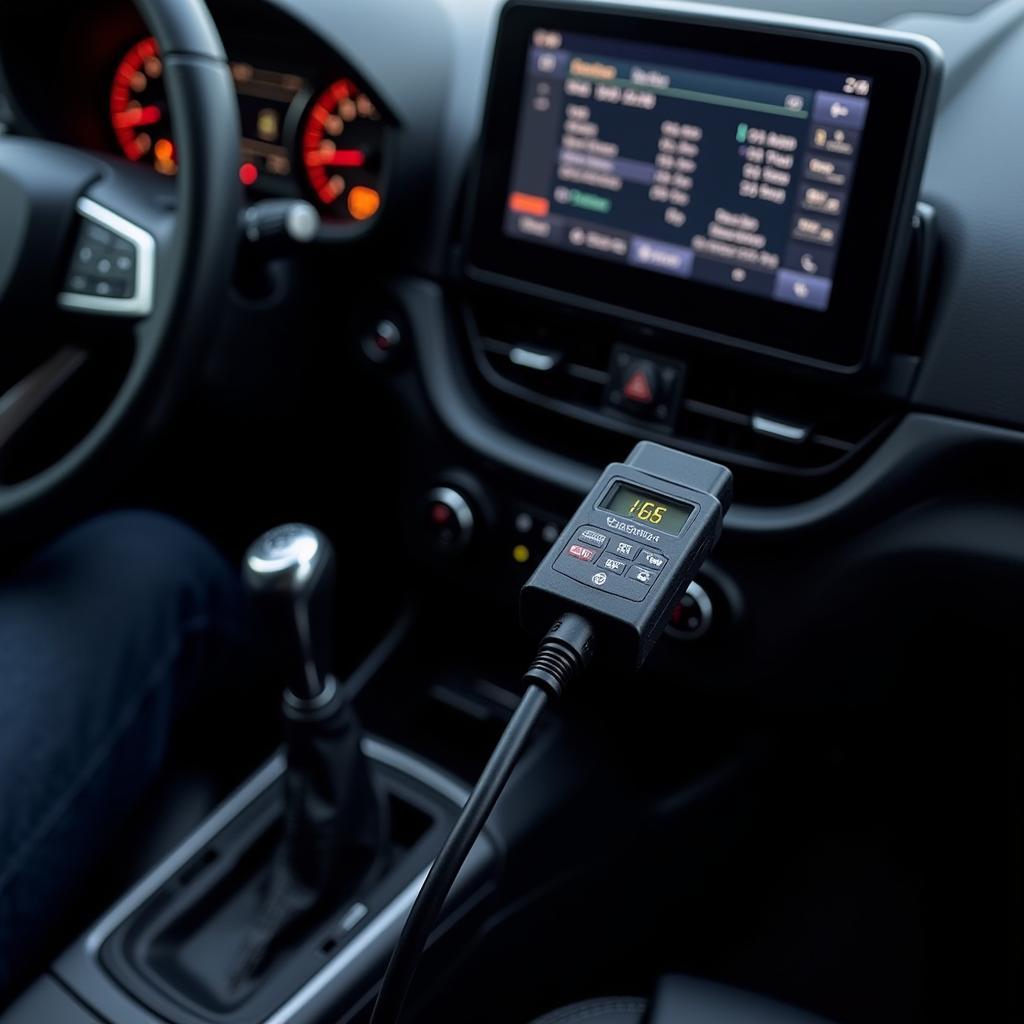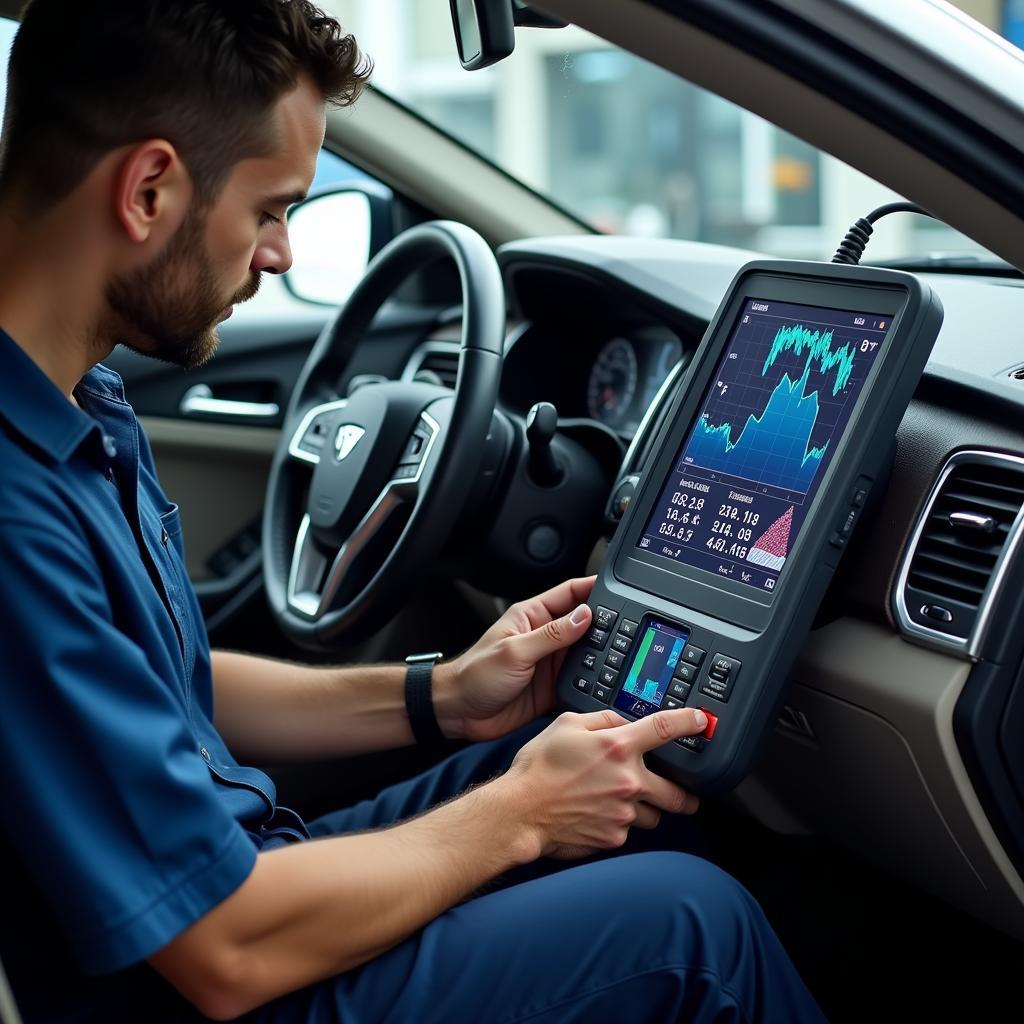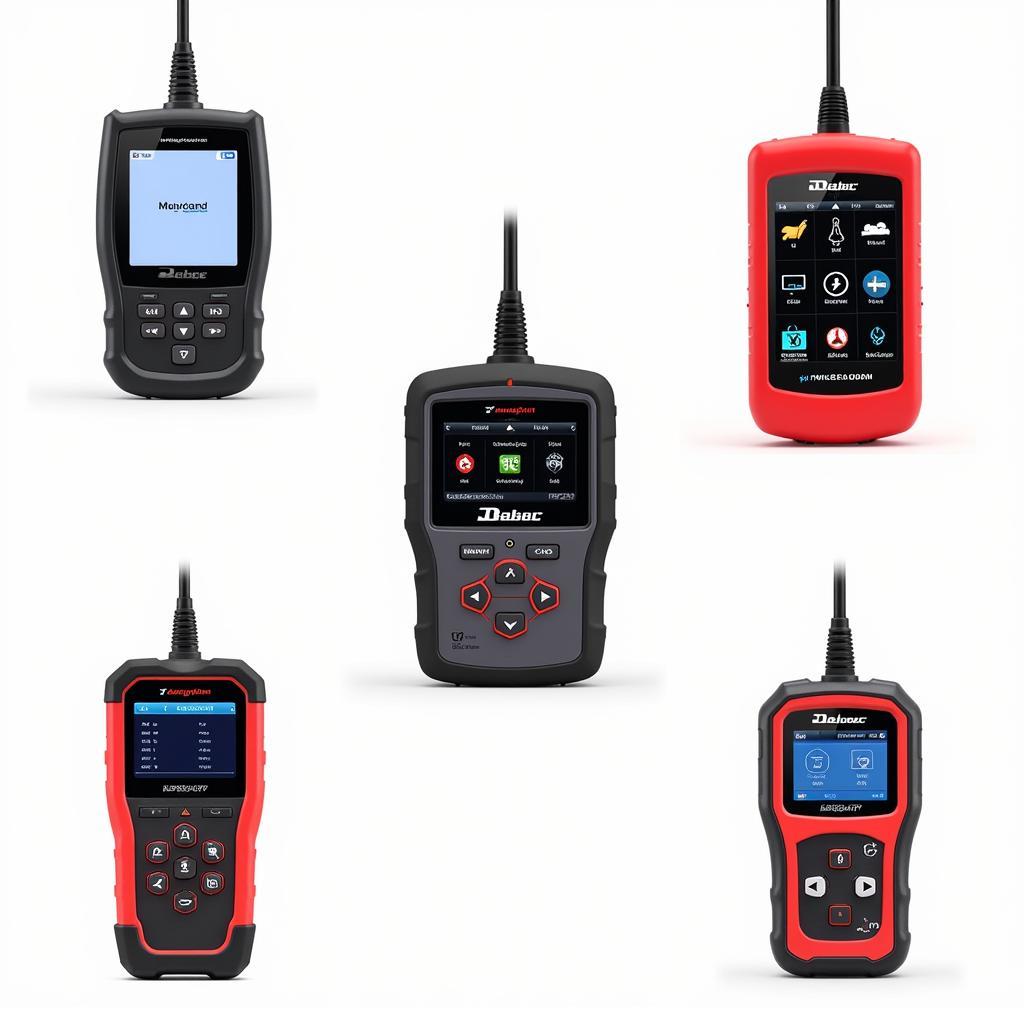Auto Zone Car Diagnostic tools have become indispensable for both car enthusiasts and professional mechanics. These tools provide a window into the intricate workings of modern vehicles, allowing users to diagnose and troubleshoot issues with greater accuracy and efficiency than ever before. Whether you’re experiencing engine problems, transmission hiccups, or mysterious warning lights on your dashboard, a car diagnostic tool can help you pinpoint the source of the problem.
Understanding Car Diagnostic Tools
At their core, car diagnostic tools work by communicating with your vehicle’s onboard computer, often referred to as the Engine Control Unit (ECU). The ECU continuously monitors various sensors and systems throughout your car, collecting data on everything from engine RPM to tire pressure.
 Car Diagnostic Tool Connected to ECU
Car Diagnostic Tool Connected to ECU
When a problem arises, the ECU stores a fault code corresponding to the specific issue. Car diagnostic tools can access these codes, providing you with valuable insights into the nature of the problem.
Types of Car Diagnostic Tools
There’s a wide range of car diagnostic tools available, each catering to different needs and skill levels.
1. Basic Code Readers
As the name suggests, basic code readers are straightforward devices designed to read and clear basic diagnostic trouble codes (DTCs). They are generally affordable and user-friendly, making them suitable for car owners who want to perform simple diagnostics themselves.
2. Advanced Scan Tools
Advanced scan tools offer a significant step up from basic code readers, providing access to a broader range of data and functionality. These tools can display live data streams from various sensors, allowing you to monitor engine performance, transmission behavior, and other vital parameters in real-time.
 Mechanic Using Advanced Scan Tool
Mechanic Using Advanced Scan Tool
Many advanced scan tools also come equipped with additional features such as:
- Bi-directional control: This feature allows you to interact with your car’s systems, such as activating solenoids or running specific tests.
- Data logging: Record data over time to identify intermittent problems or track performance trends.
- Troubleshooting guides: Some tools provide built-in databases of common fault codes and potential solutions.
3. Professional-Grade Diagnostic Systems
Professional-grade diagnostic systems are the most comprehensive and sophisticated tools available, typically used by dealerships and specialized repair shops. These systems offer advanced features like:
- ECU programming: Flashing or updating the software on your vehicle’s ECU.
- Key programming: Adding or replacing keys for your car.
- Module coding: Configuring and customizing various modules in your vehicle.
Choosing the Right Car Diagnostic Tool
Selecting the appropriate car diagnostic tool depends on your specific needs, budget, and technical expertise.
- For basic DIY diagnostics: A basic code reader is a good starting point if you primarily want to read and clear codes for common issues.
- For more in-depth troubleshooting: Consider an advanced scan tool if you’re comfortable delving deeper into your car’s systems and require live data and additional functionality.
- For professional-level repairs: Professional-grade diagnostic systems are necessary for complex tasks like ECU programming and module coding.
 Different Types of Car Diagnostic Tools
Different Types of Car Diagnostic Tools
Auto Zone Car Diagnostic: Your Gateway to Vehicle Insights
Car diagnostic tools have revolutionized the way we understand and maintain our vehicles. From simple code readers to advanced professional systems, these tools empower car owners and mechanics alike to address automotive issues with greater efficiency and precision. As technology continues to evolve, car diagnostic tools will undoubtedly play an even more crucial role in keeping our vehicles running smoothly for years to come.
FAQs
-
Are all car diagnostic tools compatible with my vehicle?
Not necessarily. Compatibility can depend on your car’s make, model, and year. It’s crucial to verify compatibility before purchasing any diagnostic tool. -
Can I use a car diagnostic tool to fix my car?
While a car diagnostic tool can help you identify problems, it won’t fix them automatically. It serves as a guide to understanding the issue, after which you can decide on the appropriate repair course. -
Where can I buy a reliable car diagnostic tool?
Reputable auto parts stores, online retailers, and specialized automotive tool suppliers are good places to start your search. -
Is it worth investing in a car diagnostic tool if I’m not mechanically inclined?
Even a basic code reader can be helpful for understanding and potentially resolving minor car problems, potentially saving you time and money on unnecessary mechanic visits. -
What are some common car problems that a diagnostic tool can help identify?
Engine misfires, oxygen sensor issues, emissions system problems, transmission faults, and airbag system malfunctions are just a few examples.
Need Help with Car Diagnostics?
If you’re facing car troubles or need expert assistance with car diagnostics, feel free to reach out to our team. We’re here to help you get back on the road quickly and safely. Contact us via WhatsApp at +1(641)206-8880 or email us at [email protected]. Our dedicated customer support team is available 24/7 to assist you.

Leave a Reply